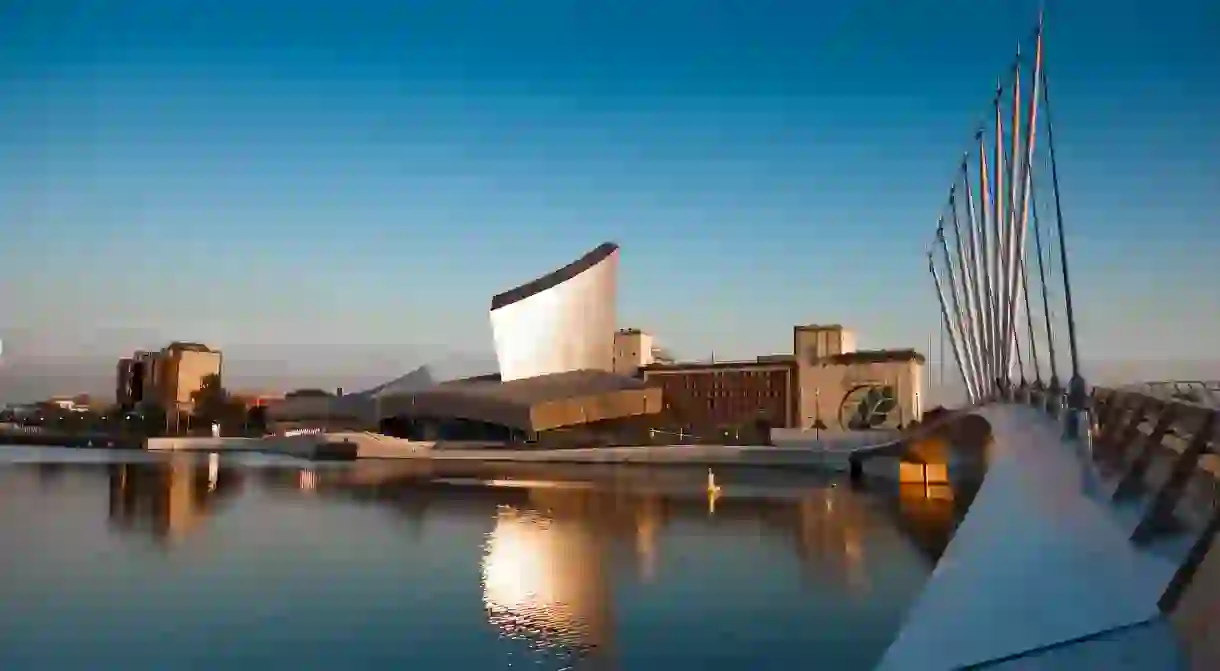An Expert's Guide to 10 of Manchester's Best Museums

Experimenting with community collaboration, redesigning iconic spaces and challenging visitors to reconsider their impact on society – Manchester museums are boldly going where few cultural institutions have gone before. Katy Ashton, director at the People’s History Museum, discusses the evolution of Manchester’s museums and shares her pick of the best.
The new HD versions of the Big Picture film shows in the Main Exhibition Space at IWM North |
There’s more to the cultural scene in Manchester than meets the eye. “It has a surprisingly diverse mix of museums for a city of its size,” says Katy Ashton, director at the People’s History Museum, Britain’s national museum of democracy. “Visitors will find everything from spaces dedicated to football, women’s rights, Egyptology and natural history.”

Despite their differences, the museums in Manchester are united by a responsibility to reflect and respect their local communities, as well as an ambition to showcase the city’s national and international impact through the ages. Here, Katy picks 10 of the best museums in Manchester and how they’re breaking the mould.
People’s History Museum
Museum

The Pankhurst Centre
Museum

“The Pankhurst Centre is an iconic site of female activism, past and present,” Ashton says. The only museum in the UK dedicated to the story of women’s fight for the right to vote, it is located in the Pankhurst family’s former home, where the first meeting of the suffragettes took place. The small museum and heritage centre continues to champion female-focused causes and doubles as the headquarters for Manchester Women’s Aid, a local charity that provides vital services to domestic abuse survivors. Supported by a dedicated team of volunteers, the museum at the Pankhurst Centre is open every Thursday (10am-4pm) and the second and fourth Sunday (1pm-4pm) of every month.
Working Class Movement Library
Library

One of the most unusual libraries in the world, this is a treasure trove of stories from Britain’s working classes, covering 200 years of campaigning. “This magnificent Victorian building houses a phenomenal range of books, a reading room and other artefacts that bring radical ideas to life,” Ashton says. This includes a large collection dedicated to Thomas Paine, British-born political activist, philosopher and revolutionary, who penned Rights of Man (1791). The rousing political text was written in defence of revolution and details some of the first plans for social welfare. Make the most of your visit with a free hour-long tour of the library, which runs twice a month: 2pm on the first Wednesday and 11am on the first Saturday.
Manchester Museum
Museum
Science and Industry Museum
Museum
Manchester was the world’s first industrial city and the Science and Industry Museum is dedicated to showcasing this side of its history. “This fantastic site creates a really evocative sense of how the city changed and progressed through the industrial ages: from hand weaving cotton through to textiles produced by machinery,” Ashton says. Its rich, interactive spaces and calendar of cool, hands-on events boost science and tech’s street cred, culminating in an annual science festival that takes place in autumn.
Bolton Museum
Museum
“An important, but sometimes overlooked part of Manchester’s identity is that we belong to a wider city region – there are plenty of cultural gems to explore just a short train, tram or bus ride away from the centre,” Ashton says. She recommends a visit to Bolton Museum, which is open daily and preserves collections of everything from fine art to botany. The star of the show is its extensive Egyptology collection that includes gilded gold masks, coffins, ancient granite columns and linen used to wrap mummies thousands of years ago.
Greater Manchester Police Museum
Museum
Jewish Museum / Central Library
Building, Library
Imperial War Museum North
Museum

The fifth and only branch of the national Imperial War Museums outside southeast England dominates the riverside opposite Salford Quays, the region’s digital and media hub. The iconic building was designed by world-renowned architect Daniel Libeskind to signify three interlocking shards of a globe shattered by conflict – a fitting prelude to the exhibitions within. “The way IWM North approaches collections about war and conflict is true to the spirit of Manchester,” Ashton says. “For example, they screen hourly Big Picture film shows within the exhibition space to create an immersive, thought-provoking experience that forces you to pause and reflect on how war shapes lives.”
National Football Museum
Building, Cathedral, Museum













